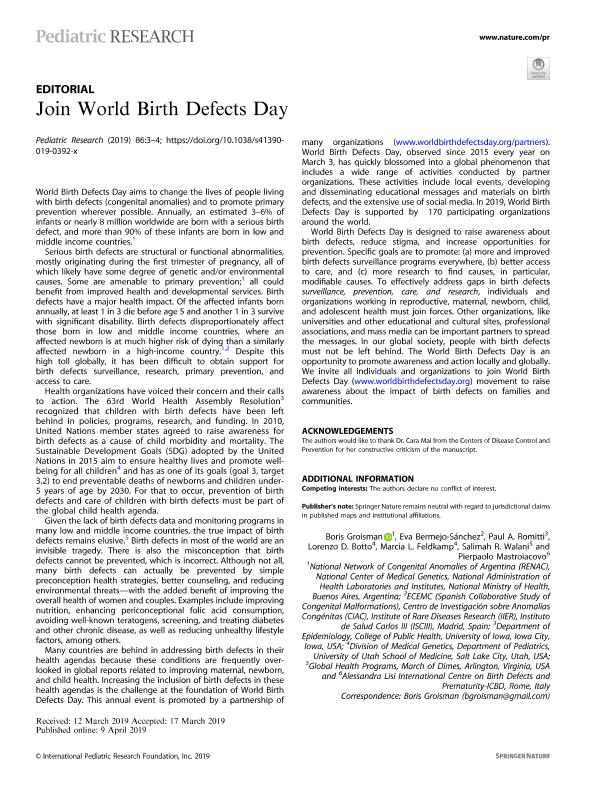Artículo
Join world birth defects day
Groisman, Boris ; Bermejo Sánchez, Eva; Romitti, Paul A.; Botto, Lorenzo; Feldkamp, Marcia L.; Walani, Salimah R.; Mastroiacovo, Pierpaolo
; Bermejo Sánchez, Eva; Romitti, Paul A.; Botto, Lorenzo; Feldkamp, Marcia L.; Walani, Salimah R.; Mastroiacovo, Pierpaolo
 ; Bermejo Sánchez, Eva; Romitti, Paul A.; Botto, Lorenzo; Feldkamp, Marcia L.; Walani, Salimah R.; Mastroiacovo, Pierpaolo
; Bermejo Sánchez, Eva; Romitti, Paul A.; Botto, Lorenzo; Feldkamp, Marcia L.; Walani, Salimah R.; Mastroiacovo, Pierpaolo
Fecha de publicación:
09/04/2019
Editorial:
International Pediatric Research Foundation
Revista:
Pediatric Research
ISSN:
0031-3998
e-ISSN:
1530-0447
Idioma:
Inglés
Tipo de recurso:
Artículo publicado
Clasificación temática:
Resumen
World Birth Defects Day aims to change the lives of people living with birth defects (congenital anomalies) and to promote primary prevention wherever possible. Annually, an estimated 3–6% of infants or nearly 8 million worldwide are born with a serious birth defect, and more than 90% of these infants are born in low and middle income countries. Serious birth defects are structural or functional abnormalities, mostly originating during the first trimester of pregnancy, all of which likely have some degree of genetic and/or environmental causes. Some are amenable to primary prevention; all could benefit from improved health and developmental services. Birth defects have a major health impact. Of the affected infants born annually, at least 1 in 3 die before age 5 and another 1 in 3 survive with significant disability. Birth defects disproportionately affect those born in low and middle income countries, where an affected newborn is at much higher risk of dying than a similarly affected newborn in a high-income country. Despite this high toll globally, it has been difficult to obtain support for birth defects surveillance, research, primary prevention, and access to care.
Palabras clave:
Surveillance
,
World Birth Defects Day
,
Pregnancy
,
Rimary prevention
Archivos asociados
Licencia
Identificadores
Colecciones
Articulos(SEDE CENTRAL)
Articulos de SEDE CENTRAL
Articulos de SEDE CENTRAL
Citación
Groisman, Boris; Bermejo Sánchez, Eva; Romitti, Paul A.; Botto, Lorenzo; Feldkamp, Marcia L.; et al.; Join world birth defects day; International Pediatric Research Foundation; Pediatric Research; 86; 1; 9-4-2019; 3-4
Compartir
Altmétricas



